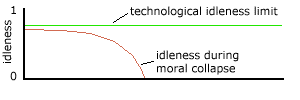
Idleness is only increased by technological innovation, by finding easy new ways of doing things. But the idleness offered by technological innovation always assumes moral virtue in its users. When social morality crumbles, and people cheat and steal from each other, idleness falls, regardless of the level of technological sophistication.
Moral behaviour - telling truth, keeping promises, and the like - might not be said to ever increase the idleness of any society, but rather to prevent idleness falling. For however virtuous the members of any society may be in their dealings with each other, it is ultimately their degree of technological development that determines the limit of their degree of idleness. A virtuous farming society equipped with pesticides, fertilizers, and motorized combine harvesters will be a more idle society than a virtuous farming society equipped with hoes and scythes and pitchforks. A society's technology determines the upper limit of its idleness. Its morality determines whether it achieves that upper limit. The reward of virtue is to achieve the highest idleness permissible given the existing degree of technological development. It is only through technological innovation that this upper limit of idleness can be raised.
Where morality disintegrates, social idleness falls. To the extent that people rob and cheat each other, break promises and tell untruths, to that extent they burden each other with work. A society devoid of morality, in which all men have become thieves, is one in which trade breaks down, and useful idleness-increasing tools cease to be distributed, and the idleness of everybody collapses.
A society may be able to tolerate a small, parasitic subculture of thieves and brigands, with some loss of its idleness. The idler the society, the larger such a subculture it can support. But if the entire society becomes composed of thieves and liars, then that society must disintegrate, and its idleness tumble, and its members perish.

And the degree of technological development of a society cannot in any way offset the moral failure of a society. The degree of technological sophistication merely determines the potential top limit of idleness: social morality determines whether that top limit is achieved. Technology is no substitute for morality.
